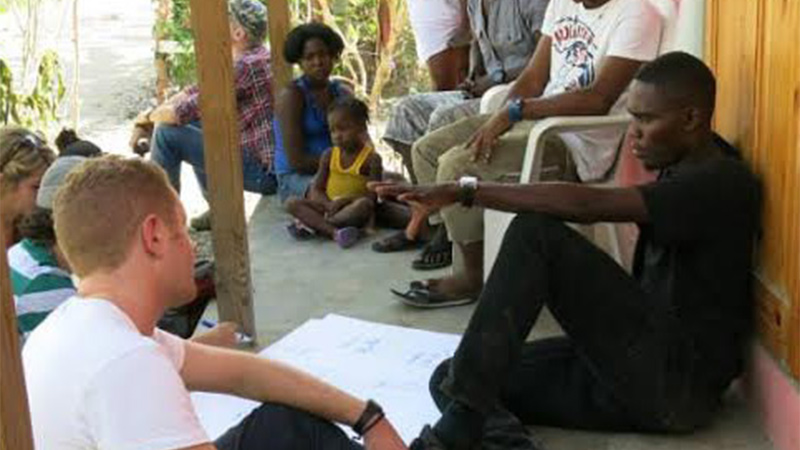Humanitarian Action and Peacebuilding
MA or PGCert
Key facts
UCAS code
P060044
Start dates
January 2026 / September 2026
Location
Course length
Part time: 30 months - Distance learning only
School(s)
Overview
The Humanitarian Action and Peacebuilding master's degree is for practitioners already working in these fields and in related areas.
Designed and delivered jointly with the United Nations Institute for Training and Research (UNITAR), the Humanitarian Action and Peacebuilding master's gives you access to resources and support from both institutions online and in the field through UN missions, and we use the knowledge and expertise of the Centre for Development and Emergency Practice (CENDEP).
A flexible and user-friendly online learning environment enables you to learn from your workplace. During the course you will:
- investigate cutting-edge issues in the field
- propose innovative tools
- reflect on current field practices
- broaden your perceptions
- develop and refine the hard and soft skills needed to work effectively.
You will have support from a team of academic experts and top-ranked practitioners, and field experts for specific topics.
This course is also relevant for practitioners working in other fields interested in exploring opportunities in conflict transformation.

How to apply
Entry requirements
Specific entry requirements
The programme is open to all candidates who fulfil at least one of the following conditions:
- hold an approved honours degree (or equivalent) at 2:1 or above in a relevant discipline, and preferably some experience in the field of humanitarian action and peacebuilding or related fields
- hold a relevant recognised diploma and/or certified professional qualification and 3 to 5 years' experience in humanitarian action and peacebuilding or related fields
- have substantial and proven field experience (minimum 10 years) in humanitarian action, peacebuilding and related fields.
In exceptional circumstances, where applicants can show that they have qualifications or experience or both that demonstrate that they have knowledge and capabilities equivalent to those listed above, they may be admitted onto the course.
Please also see the University's general entry requirements.
English language requirements
At least 6.5 in IELTS, with a minimum of 6.0 across all four components of the test.
Please also see the University's standard English language requirements.
English requirements for visas
If you need a student visa to enter the UK you will need to meet the UK Visas and Immigration minimum language requirements as well as the University's requirements. Find out more about English language requirements.
Pathways courses for international and EU students
We offer a range of courses to help you meet the entry requirements for your postgraduate course and also familiarise you with university life in the UK.
Take a Pre-Master's course to develop your subject knowledge, study skills and academic language level in preparation for your master's course.
If you need to improve your English language, we offer pre-sessional English language courses to help you meet the English language requirements of your chosen master’s course.
Terms and conditions of enrolment
When you accept our offer, you agree to the Terms and Conditions of Enrolment. You should therefore read those conditions before accepting the offer.
Application process
Tuition fees
Questions about fees?
Contact Student Finance on:
Tuition fees
Fees are quoted for the first year only, fees for the second year will remain the same.
The following factors will be taken into account by the University when it is setting the annual fees: inflationary measures such as the retail price indices, projected increases in University costs, changes in the level of funding received from Government sources, admissions statistics and access considerations including the availability of student support.
How and when to pay
Tuition fee instalments for the semester are due by the Monday of week 1 of each semester. Students are not liable for full fees for that semester if they leave before week 4. If the leaving date is after week 4, full fees for the semester are payable.
- For information on payment methods please see our Make a Payment page.
- For information about refunds please visit our Refund policy page
Additional costs
Please be aware that some courses will involve some additional costs that are not covered by your fees. Specific additional costs for this course are detailed below.
Optional costs
| Additional costs | Amount (£) |
|---|---|
It’s your responsibility to cover print / binding costs where coursework submission is required. Please note that a lot of the coursework is now submitted online. |
From £30 |
| You may choose to purchase books to support your studies. Many books on our reading lists are available via the Library, or can be purchased secondhand. | £20-60 per book |
Accommodation fees in Brookes Letting (most do not include bills) |
£94-265 per week |
Accommodation fees in university halls (bills included, excluding laundry costs) |
£135-200 per week |
Graduation costs include tickets, gowning and photography. Gowns are not compulsory but typically students do hire robes, starting at £41. |
Typically £0-200 |
Students are responsible for their own travel to and from university for classes. For the 2025/26 academic year, the University is introducing an alternative subsidised travel offer for all students with further information on our Travel webpages. |
From £10 |
Funding your studies
Financial support and scholarships
Featured funding opportunities available for this course.
All financial support and scholarships
Learning and assessment
This course has been designed to be studied by students working in the field.
100% Online delivery
The programme is 100% online conducted via webinars, tutorials, discussions and group work. The workload per module is estimated to be 200 hours per module divided into four types of activities.
Around 25 % of your time will be spent in staff-led activities such as webinars, tutorials and discussions, 25% of your time will be spent in self-led activities such as readings or independent exercises, another 25 % will be used in preparing your assignments and finally the remaining quarter of your workload will be directly derived from or based on professional past of current practices.
Part-time
This part-time programme is usually studied over 30 months. Being part-time, it allows you to remain in the field working whilst completing your studies. However, you can extend your studies if needed and take up to 5 years to complete it. Or finish it in 24 months if you can take time off work to complete the course.

Start this course in January or September
You can start this course in January if a September start doesn't suit you or is not currently offered for this course.
If you start in January you will study a range of modules between January and May. During the summer months of June, July and August you will study further modules and begin work on your dissertation. Between September and December you will complete your final modules and focus on your dissertation.
Study modules
The modules listed below are for the master's award. For the PGCert award your module choices may be different. Please contact us for more details.
Please note: As our courses are reviewed regularly as part of our quality assurance framework, the modules you can choose from may vary from those shown here. The structure of the course may also mean some modules are not available to you.
Learning and teaching
This programme is based on self-led learning and strong interactive teaching tools, as much on peer-to-peer as on tutors’ mentoring.
You’ll learn from the workplace, using practical cases either through action-research or through case studies; particularly in 'learning by doing', 'self-reflection' and 'action testing of theories'.
The course merges practice-based knowledge from field practitioners with research outputs from practice-oriented scholars. We use studies and theories from:
- social sciences
- peace and conflict studies
- humanities
- political sciences
- law
- urban planning
- architecture.
UNITAR and Brookes have considerable experience in delivering humanitarian education to humanitarian actors in field operations. Insight from previous education programmes in similar settings shows that learners are often under constant stress, working in harsh conditions and with limited access to the internet.
As a result, a variety of learning tools are applied within each module.
Assessment
Assessment methods used on this course
Our course is based on self-led learning. You'll engage with strong interactive teaching tools and peer-to-peer learning. Our teaching methods include:
- online lectures
- webinars
- tutorials
- debates
- discussions
- action research
- experience sharing
- discussions with key practitioners
- critical reflection on practices.
You will learn from your workplace, using practical cases through action research or case studies and you will:
- develop new knowledge based on the specifics of humanitarian action and peacebuilding
- improve related practices
- reflect and acquire attitudes and personal competences.
Research
This course is a joint initiative from the Centre for Development and Emergency Practice (CENDEP) at Oxford Brookes and the UNITAR Peacekeeping Training programme.
The CENDEP is a multidisciplinary research centre. We develop practice-oriented approaches for conflict, and disaster-settings focus on:
- humanitarian action
- recovery
- development
- human rights
- peacebuilding.
Our research contributes to knowledge for the development of:
- global policy-making
- development of national laws and strategies
- mobilisation and engagement with local communities.
The United Nations Institute for Training and Research (UNITAR) Peacekeeping Training Programme contributes to the international community’s efforts towards the peaceful resolution of conflicts, and the building of lasting peace. Training and capacity-development activities cover:
- multilateralism
- economic development and social inclusion
- environmental sustainability and green development
- sustainable peace
- research and technology applications.
After you graduate
Career prospects
This course is ideal for a career in the field of humanitarian action, conflict transformation or related fields, such as:
- civil servants or diplomats in charge of humanitarian affairs
- academics teaching humanitarian practices
- journalists seeking a better understanding of humanitarian issues
- military personnel ready to be deployed in a field of operation where humanitarian actions are taking place.
Related courses
Programme changes:
On rare occasions we may need to make changes to our course programmes after they have been
published on the website. For more information, please visit our
changes to programmes page.
